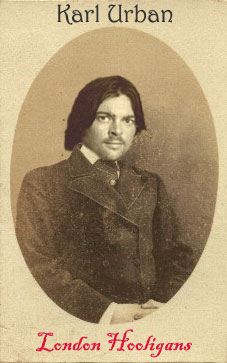Headquarters - About - Who's Who - Gang Adventures - Disclaimer
Who's Who in London Hooligans - Karl Urban
All the world’s a stage
And all the men and women merely players
Karl was born on 12th May 1866, first and only child of a poor but honest blacksmith. His mother was French, a beautiful, loving woman who doted on him. He was a slight child, more interested in books than sports, more interested in doing his homework than helping his father at the shop. When he was eight, an accident there claimed his father’s life, and Karl couldn’t help but blame himself.
With no real family or friends to turn to, Karl’s mother brought her son back to France. They moved in with Karl’s grandmother- a sharp and overbearing tyrant of a woman who took an immediate dislike to him, refusing even to teach him the language. The only words he knew were “petit roi,• the nickname his mother had called him all his life. Little king. His grandmother said he looked exactly like his father, the same man she had forbid her daughter to marry not ten years before. He spent several miserable years there, the old woman assigning him chore after chore, striking him when he disobeyed and when he didn’t. His mother, once bright and vivacious, withered and washed out like the paintings that lined the walls in the small, dark house.
He withdrew from school, finding it difficult to make friends in the foreign country. He instead spent his days on the street, eventually falling in with one of the street gangs. They accepted him because he spoke English, and even at fourteen he didn’t look a day over ten. Not much later he was arrested, though he didn’t at the time know what he had done. His grandmother saw this as further proof of his innate evil tendencies, watched with a stony expression as they carted him off.
It was in prison that he began to read again, remembering his early dreams of acting and writing. He read voraciously, anything he could lie, cheat, or fuck for. It was also in prison that he learned the pleasures and displeasures of the flesh, swearing to himself every night that his cellmate shoved him against the wall that he would never feel so used again. The lilting words of long dead men were his comfort, a reassurance of the continuity of time, the only remaining ties to a time when his life was simple. His time in prison also made him strong, and the broad-shouldered, reticent man who emerged at the age of eighteen was a far cry from the delicate, dreamy child he once was.
They have their exits and their entrances;
And one man in his time plays many parts
When he returned to his grandmother’s house, he learned of his mother’s death of consumption. He was unwelcome there, and worked odd jobs for several months before giving up. He still dreamt of better things, but now he simply lacked the desire to achieve them. He left France on his nineteenth birthday, hoping the return to his birthplace would rekindle what he had lost- though he didn’t exactly know what it was.
He knew no useful trade, only the words to all of Shakespeare’s tragedies. His cellmate once asked him, in a rare state of lucidity and contemplation, why he never read the comedies. Karl did not have to think very hard about the answer. “It’s a waste of time,• he answered, not without bitterness. “It’s not funny.•
He spent his days going from playhouse to playhouse searching for work, his nights roaming the streets of a city he once knew like the back of his hand. The signs and faces had changed, but the city was the same, and he couldn’t decide whether to be disappointed or comforted by that. He made no trouble, knew the value of silence, the importance of waiting and watching. Instead, he bided his time until the opportunity presented itself.
He was, after all, an actor at heart. Standing outside the building, he wondered only what part he would play next.
